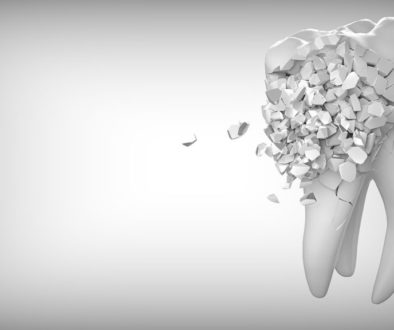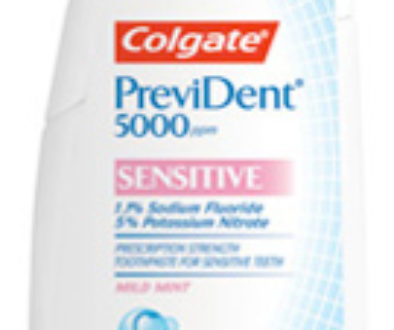Do You Need A High Fluoride Toothpaste?
 Did you know that brushing with a fluoride toothpaste consistently is one of the single easiest ways to reduce the number of cavities you develop? A 1000 ppm fluoride toothpaste reduces cavities by approximately 23% while a toothpaste in the range of 2400-2800 ppm reduces cavities by about 36%. A 5000 ppm high fluoride toothpaste reduces the cavity risk even more, estimated to be about a 42% reduction. This is huge for something you only have to spend about 4 minutes doing!
Did you know that brushing with a fluoride toothpaste consistently is one of the single easiest ways to reduce the number of cavities you develop? A 1000 ppm fluoride toothpaste reduces cavities by approximately 23% while a toothpaste in the range of 2400-2800 ppm reduces cavities by about 36%. A 5000 ppm high fluoride toothpaste reduces the cavity risk even more, estimated to be about a 42% reduction. This is huge for something you only have to spend about 4 minutes doing!
Over the counter toothpastes come in an array of different concentrations. Typical over the counter concentrations range anywhere from 1000 parts per million (ppm) to 1500 ppm in the United States. Other countries allow higher concentrations. It gets even more confusing on the packages because they aren’t always labeled with their fluoride in parts per million. Instead they like to label them as a percentage of their fluoride compound. Here are some conversions to give you an idea of what the different concentrations are equal to.
1000 ppm = 0.4% stannous fluoride, 0.22% sodium fluoride, or 0.76% sodium monofluorophosphate
1500 ppm = 0.6% stannous fluoride, 0.33% sodium fluoride, or 1.14% sodium monofluorophosphate
5000 ppm = 1.1% sodium fluoride
Confusing right? I’m a dentist and I struggle to keep up with all these different percentages! Don’t worry, I’m going to make this easier on you though. If you have a low risk of developing cavities start using Colgate Total. It’s a good toothpaste with 1100 ppm of fluoride, low abrasiveness, and is helpful for reducing gingivitis and inflammation. Fluoride concentration isn’t going to be as big a deal for you. If you have a higher risk for cavities or any of the following conditions, we’re going to get to what you need here soon…
Who should use a high fluoride toothpaste?
I think more people should be using a high fluoride toothpaste than currently are. As of now it is a relatively rare to see patients using a prescription strength, high fluoride toothpaste. People at the most risk will benefit from it the most…
- Active cavities
- History of cavities in the last couple of years
- Exposed root surfaces
- Large numbers of fillings or crowns present
- Dry mouth
- Sensitivity
- In braces
There a lot of people who fall into these categories. I’d estimate upwards of half of all people I see fall into one, if not more of these categories.
What are the benefits of a high fluoride toothpaste?
- It reduces your risk of developing cavities
- It can remineralize areas of demineralized enamel
- It can stop existing cavities from getting larger
- It can reduce sensitivity
- It has low abrasiveness values (in all the products I’ve seen anyway)
To give you an idea of just how effective high fluoride toothpaste can be let’s take a quick look at one specific study. Researchers compared high fluoride toothpastes to regular strength toothpastes on patients at extremely high risk of decay. Who were these people? Elderly patients in a nursing home. Elderly patients are especially at risk because they usually have a dry mouth from medications, they struggle to keep their teeth clean with reduced dexterity, and they usually have plenty of root surface showing on their teeth. These root surfaces are at an extremely high risk of decay. In these nursing homes they didn’t treat these root surface cavities with fillings. They just brushed twice a day with either regular strength fluoride toothpaste or with high fluoride (5000 ppm) toothpaste. The results? There were far less active cavities and far more arrested cavities in the group using the high fluoride toothpaste. The high fluoride toothpaste actually helps to stop the spread of existing cavities and even reverse them in some cases.
What are the instructions for a high fluoride toothpaste?
- Most dentists will recommend that you brush with it once a day for two minutes. Brush with regular toothpaste another time during the day.
- Spit out any excess toothpaste but don’t rinse. This allows the fluoride to absorb into your teeth better.
- You should avoid eating or drinking for 30 minutes after brushing.
Can kids use a high fluoride toothpaste?
Children age 6 and up, up to age 16 can use this toothpaste with some special rules.
- Only a tiny smear should be used on their toothbrush.
- They must be able to spit it out effectively.
- They should rinse their mouth out thoroughly with water after brushing and spit that out as well.
What are the common brands?
Clinpro 5000, Prevident 5000, and Denta 5000 are the most common brands you’ll see. All are good.
How do I get a high fluoride toothpaste?
Toothpastes with 5000 ppm require a prescription. Easiest way to get a prescription? Ask your dentist for one. Pretty much any dentist will be thrilled that you care enough to use a high fluoride toothpaste and will quickly write it for you.
What are the dangers of high fluoride toothpaste?
The biggest danger with high fluoride toothpastes is if a child gets a hold of them and eats a lot of the toothpaste. Please keep high fluoride toothpastes out of reach of children.
Otherwise, there are very few other complications associated with high fluoride toothpaste. It is a topical product so there is very minimal exposure to the rest of your body.




April 12, 2017 @ 2:47 pm
The article makes a compelling argument for high fluoride toothpaste, we will look into the different brands available.
Best Toothpaste For Sensitive Teeth | The Healthy Mouth Project
March 5, 2017 @ 3:51 am
[…] High fluoride toothpastes like Prevident 5000 decrease your risk for cavities by a significant margin. Fluoride combines with the enamel crystals in your teeth to form an even harder crystal that is more resistant to acid attack. I’ve written before about how I think most people would benefit from a prescription strength fluoride toothpaste. […]
How To Prevent Cavities | The Healthy Mouth Project
February 6, 2017 @ 7:06 am
[…] If you’re highly prone to getting cavities I’d highly recommend you ask your dentist about a prescription strength fluoride toothpaste. My personal favorite is Prevident 5000 but there are a lot of other options out there. Prescription strength fluoride toothpastes can significantly reduce your risk of cavities. If you’d like more information about high fluoride toothpastes I’ve got a whole article devoted to that topic here. […]